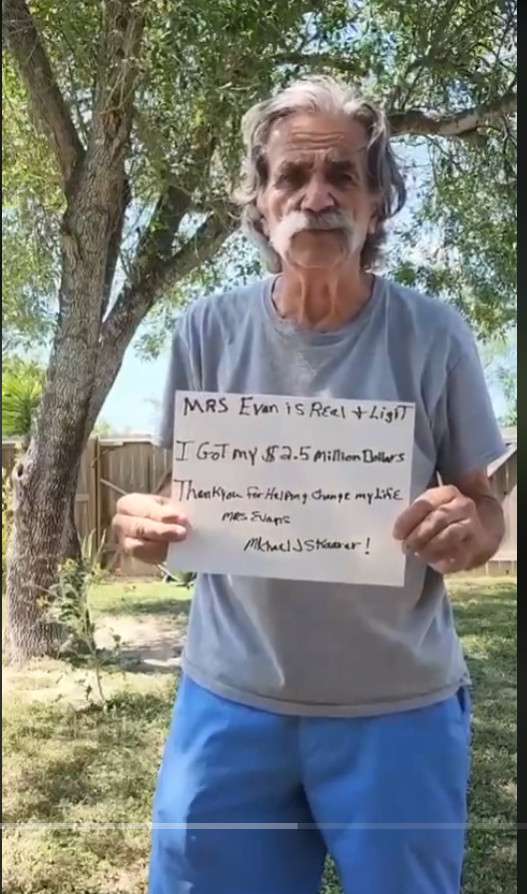Have you ever dreamed of a windfall, a sudden influx of cash that could change your life forever? The allure of easy money can be irresistible, but it's precisely this desire that scammers exploit with devastating effectiveness. They prey on hope, dangling the promise of riches while stealthily picking your pockets.
One particularly insidious scheme making the rounds online involves the impersonation of a fictitious billionaire named Evan Kate. This elaborate con targets vulnerable individuals with promises of immense financial assistance, only to leave them defrauded and disillusioned. The "Evan Kate billionaire money giveaway scam" operates through various social media platforms like Instagram, Facebook, and TikTok, where scammers create fake profiles mimicking a benevolent benefactor eager to share their wealth.
| Aspect | Details |
|---|---|
| Name Used | Evan Kate (often presented as a billionaire investor or heiress) |
| Modus Operandi | Contacting individuals on social media platforms (Instagram, Facebook, TikTok) offering large sums of money. Claiming to want to "bless" people in difficult situations or "help the poor." |
| Bait | Promises of millions of dollars (e.g., $2.5 million) in grants or financial assistance. |
| The Hook | Requesting small "processing fees," "bank transfer fees," or prepaid gift cards (e.g., Vanilla cards) before the promised money can be released. |
| Target Audience | Individuals in financial need, those susceptible to get-rich-quick schemes, and people active on social media. Geographically, Arizona, USA has been mentioned, but the scam is likely widespread. |
| Red Flags | Requests for upfront payments to receive a grant or gift, poor grammar and spelling in messages, use of generic or stolen profile pictures, pressure to act quickly, and inconsistencies in the story. |
| Platforms Used | Instagram, Facebook, TikTok. |
| Associated Names | Evan Doris, Evan Katie, Kate (used in different fake profiles). |
| Real Person Misused (Potentially) | The name "Kate Evans" (a real person born in Montreal and raised in Surrey, England) might be used to lend credibility to the scam. |
| Legal Advice | A lawyer has confirmed that a driver's license presented as proof of identity was fake and advised reporting the scam to the police and the FBI. |
| Reference Website | Federal Trade Commission (FTC) |
The scam typically unfolds with a seemingly benevolent message appearing in a victim's inbox. The message, often riddled with grammatical errors and inconsistencies, claims that Evan Kate is giving away money to help those in difficult circumstances. The sums promised are often staggeringly large, designed to overwhelm the recipient's skepticism. For instance, one individual reported being offered $2.5 million.
- Camila Araujo Erome Pics Vids The Latest Leaks Updates
- Bollyflix More Find Bollywood Hollywood Movies Online Now
Once the victim expresses interest, the scammer initiates the hook. They claim that to receive the promised funds, the victim must first pay a small "processing fee" or "transfer fee." This fee is usually requested in the form of prepaid gift cards, such as Vanilla cards, making it difficult to trace and recover the funds. The amounts requested are often relatively small, perhaps a few hundred dollars, making them seem insignificant compared to the millions purportedly awaiting the victim. However, once the victim pays the fee, the scammer disappears, leaving the victim empty-handed and significantly poorer.
One victim recounted being asked to purchase a $200 prepaid Vanilla card to receive their $2.5 million "blessing." When the victim challenged the request and began posting warnings on the scammer's videos, the Evan Kate profile was swiftly deleted, highlighting the scammer's awareness of being exposed.
The use of social media platforms provides scammers with a vast pool of potential victims and a veil of anonymity. They create multiple fake profiles, often using stolen or generic profile pictures, to perpetuate the illusion of legitimacy. These profiles frequently display a veneer of wealth and generosity, further enticing unsuspecting individuals.
- Alyx Star Biography Age Net Worth More Revealed
- Ullu Originals Exciting Web Series Avoiding No Results
Reports indicate that the scammers have been targeting individuals in Arizona, USA, but the scam is likely widespread, affecting people across the globe. They often use names like Evan Doris, Evan Katie, or simply Kate in their various profiles.
It is crucial to recognize the red flags associated with this scam. Any unsolicited offer of a large sum of money that requires an upfront payment is almost certainly a scam. Be wary of messages with poor grammar and spelling, inconsistencies in the story, and pressure to act quickly. Always verify the identity of the person offering the money and never send money to someone you have only interacted with online.
The "Evan Kate" scam preys on people's vulnerabilities and exploits their hope for financial relief. It is a stark reminder of the importance of exercising caution and skepticism when encountering offers that seem too good to be true. As the saying goes, if it sounds too good to be true, it probably is.
The case of Kate Evans, born in Montreal, Canada, and raised in Surrey, England, adds another layer of complexity. While there is no direct evidence linking her to the scam, the use of her name or likeness in fake profiles cannot be ruled out. This highlights the potential for scammers to misuse real people's identities to lend credibility to their schemes.
Individuals who have fallen victim to this scam are advised to report it to the police and the FBI. A lawyer has confirmed that at least one driver's license presented as proof of identity by the scammers was fake, underscoring the need for law enforcement involvement. Reporting the scam can help authorities track down the perpetrators and prevent others from becoming victims.
The "Evan Kate" scam is just one example of the many fraudulent schemes circulating online. It is essential to stay informed and vigilant, and to educate others about the tactics used by scammers. By raising awareness and promoting critical thinking, we can help protect ourselves and our communities from these harmful schemes.
The incident in Houston, Texas in 2025, involving Mary Kate Cornett and allegations of cheating, bears no direct relation to the "Evan Kate" scam but highlights the complex web of online controversies and misinformation that can be exploited by scammers. These unrelated events can become intertwined in the digital landscape, blurring the lines between reality and fiction and making it more difficult to discern legitimate information from fraudulent claims.
The online world, for all its benefits, is also a breeding ground for scams and misinformation. It is up to each of us to exercise caution, skepticism, and critical thinking to navigate this complex landscape and protect ourselves from harm.
Evan and Katelyn, on the other hand, represent a completely different online presence. This husband and wife team are known for their DIY projects and gaming content, showcasing their creativity and skills on platforms like Patreon and YouTube. Their work is a testament to the positive side of online communities, where people can connect, learn, and share their passions.
Supporting creators like Evan and Katelyn through platforms like Patreon and YouTube memberships provides access to exclusive content and helps sustain their work. This direct support empowers creators to continue producing valuable and entertaining content, fostering a positive and creative online ecosystem.
Their journey began when they met at the age of 18, and eight years later, they married, bought a house, and embarked on a DIY adventure. Their story is an inspiring example of how passion, hard work, and creativity can lead to a fulfilling life and a thriving online community.
The "Evan and Katelyn 2/20/25" reference likely pertains to a specific date or event related to their content, but it is unrelated to the "Evan Kate" scam. It is important to differentiate between these two distinct online entities to avoid confusion and prevent the spread of misinformation.
Similarly, the mention of an "Ergonomic laptop frame (or ergotop)" is unrelated to the scam but highlights the diverse range of products and services advertised online. It is crucial to assess the credibility of these advertisements and to research products and companies before making any purchases.
Facebook provides a platform for connecting with people and sharing information, but it is also a potential breeding ground for scams. While viewing the profiles of people named Evan Kate may seem like a way to gather information, it is important to remember that these profiles may be fake and that any information shared on them should be treated with caution.
The TikTok accounts using the name "Evan Kate" (@officialevankate, @therealevankate111, @evankateoffcial) are likely associated with the scam. These accounts often display messages claiming to be from a caring and honest billionaire who wants to help the poor. The use of emojis and generic phrases is a common tactic used by scammers to attract attention and create a sense of false legitimacy.
The phrase "When this happens, it's usually because the owner only shared it with a small group of people, changed who can see it or it's been deleted" likely refers to a situation where a social media post or profile is no longer visible. This could be due to privacy settings, deletion by the user, or removal by the platform for violating its terms of service. In the context of the "Evan Kate" scam, this could indicate that a scammer's profile has been reported and removed by the platform.
The controversy surrounding Mary Kate Cornett in 2025, originating in Houston, Texas, and related to Ole Miss, the SEC, and various social media tags, serves as a cautionary tale about the potential for online scandals and the spread of misinformation. While unrelated to the "Evan Kate" scam, it underscores the importance of critical thinking and responsible online behavior.
Ultimately, the "Evan Kate" scam and the various online controversies mentioned serve as reminders of the importance of staying informed, vigilant, and skeptical in the digital age. By understanding the tactics used by scammers and by exercising caution when encountering suspicious offers or information, we can protect ourselves and our communities from harm.
The key is to remember that verifiable reality exists, and that critical thinking is the best weapon against deception. Verify, verify, verify. And if something sounds too good to be true, always, always walk away.
The seemingly random mentions of "Evan and Katelyn gaming uncut," their Patreon support system, and even the ergonomic laptop frame serve to highlight the stark contrast between genuine online communities and the predatory practices of scammers. While Evan and Katelyn build a community through shared interests and creative endeavors, the "Evan Kate" scam aims to exploit individuals for personal gain.
Supporting genuine content creators is a way to foster a positive online environment. By choosing to engage with and support authentic creators, we can contribute to a digital space that is more creative, informative, and less susceptible to scams and misinformation.
The "Evan Kate" scam's longevity lies in its adaptability. Scammers constantly evolve their tactics, using new platforms and exploiting current events to lure in victims. This underscores the need for continuous vigilance and education.
The use of fake profiles and stolen identities is a hallmark of online scams. Scammers often create elaborate backstories and use convincing profile pictures to build trust and credibility. It is essential to be wary of anyone you have only interacted with online, especially if they are asking for money.
The "Evan Kate" scam highlights the dark side of online anonymity. The ability to create fake profiles and hide behind a screen allows scammers to operate with impunity. This underscores the need for greater accountability and regulation in the online world.
The best defense against online scams is education and awareness. By staying informed about the latest scams and by sharing this information with others, we can help protect ourselves and our communities from these harmful schemes.
The seemingly random details mentioned throughout this article, such as the date "2/20/25," the location "Houston, Texas," and the various social media tags, serve as a reminder of the vast and interconnected nature of the online world. These seemingly disparate pieces of information can be used by scammers to create convincing and believable narratives.
The mention of "meme coin" in connection with the Mary Kate Cornett controversy highlights the volatile and often unregulated nature of cryptocurrency markets. Scammers often exploit these markets to defraud unsuspecting investors.
The fact that a lawyer confirmed a fake driver's license in connection with the "Evan Kate" scam underscores the severity of the crime and the potential for legal repercussions. Scammers often use forged documents to further their deception and to avoid detection.
The online world is a complex and ever-evolving landscape. It is essential to navigate this landscape with caution, skepticism, and a healthy dose of common sense. By staying informed, vigilant, and proactive, we can protect ourselves and our communities from the many dangers that lurk online.
In conclusion, the "Evan Kate" scam serves as a stark reminder of the importance of online safety and awareness. By understanding the tactics used by scammers and by exercising caution when encountering suspicious offers or information, we can protect ourselves from harm and contribute to a safer and more secure online environment.
- Is Jackermans Mothers Warmth Chapter 3 Release Soon Find Out
- Rhona Mitra Is The Actress Single Relationships Net Worth


